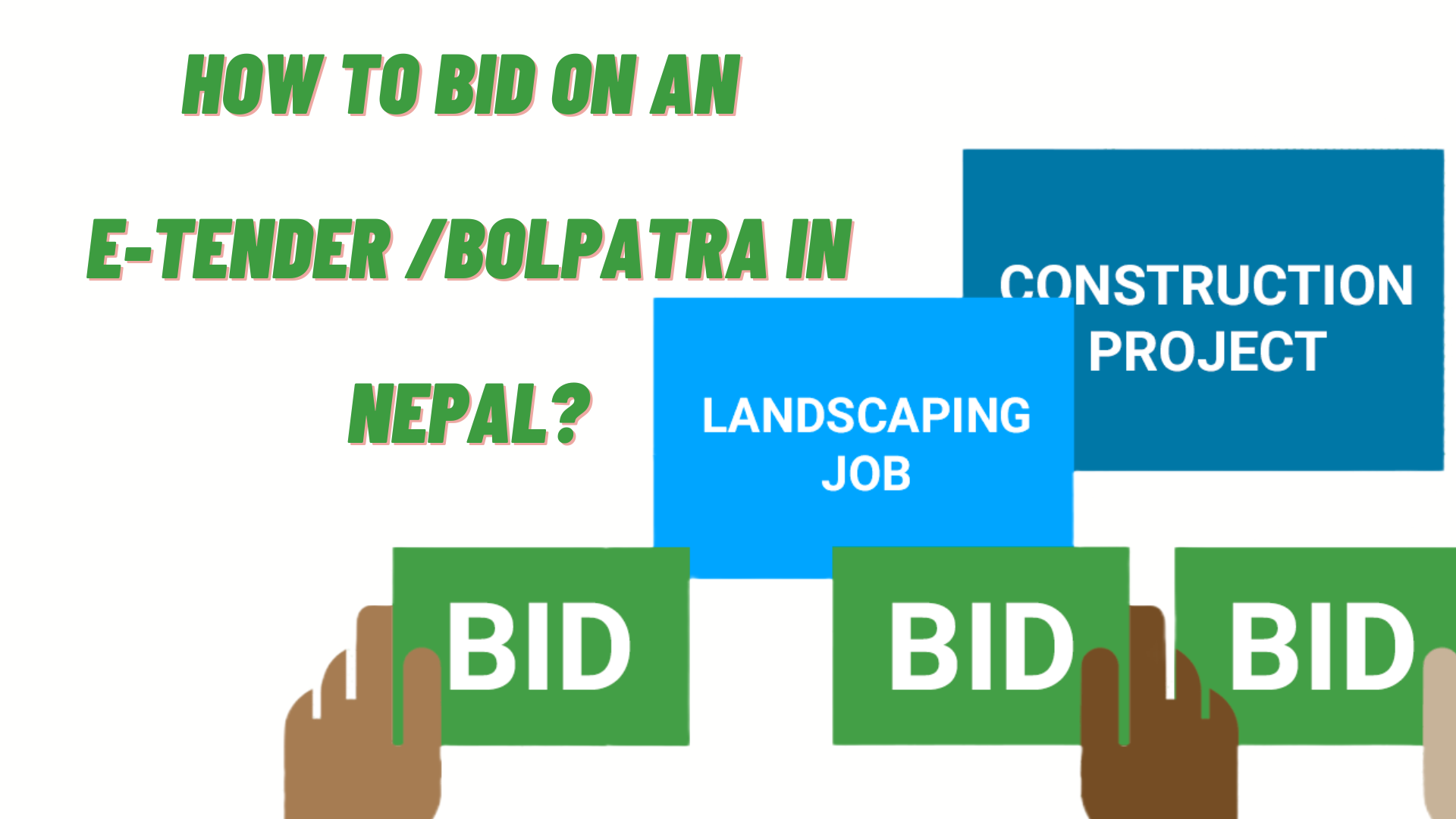How do I bid on an e-tender / Bolpatra in Nepal?
Any government organization operated by the Government of Nepal or a university that receives full or nearly full government funding follows the e-Government Procurement (e-GP) System when procuring goods.
This paper provides an insight over the e-Government Procurement (e-GP) System in great detail. Before learning about it, it is best to be familiar with its terminology in general.
What does the term Bid/Bolpatra mean?
The term “bid” refers to a document developed by the Nepalese government for the construction of any structure or consultant for national or international bidders and made public by advertising the price, proposal, or rate of construction and service for procurement.
Who is the Bidder?
A bidder is any individual, enterprise, organization, or business at the national or international level who has submitted or may have submitted a proposal to participate in procurement processes.
What is a Bidding Document?
“Bidding Document” refers to a document created by the relevant Public Entity that serves as an invitation to bid, inviting bidders to submit their offers by filling out or preparing a price, proposal, or rate
This term also includes bidder instructions, specifications, drawings, designs, terms of reference, schedules of work, evaluation criteria, bills of quantities, and similar other documents.
What is a Procurement Contract?
A “Procurement Contract” is a contract for supplies or services signed by a public entity and a supplier, builder, consultant, or other service provider.
Bid Security
“Bid Security” refers to retention funds or earnest money given as a guarantee before any obligation or work is completed. To participate in the tender process, the applicant must make a deposit of a certain amount known as bid security or performance security.
What are the e-bidding qualification criteria?
The qualification criteria are kept in the E-Bid or Bolpatra bidding documents. This is also referred to as pre-qualification proceedings.
Maintaining professional and technical qualifications, equipment availability, historical performance, after-sale service agreements, spare part availability, legal capacity, and financial resources are all examples of what this entails.
If the project is complex, or to purchase high-value commodities such as industrial plants, or to identify qualified bidders, the Public Entity must create pre-qualification papers and publicly call for proposals for pre-qualification determination.
What is a bid invitation?
A notice issued by the federal or state government requesting bids on the purchase of goods, services, or construction is known as an invitation to bid. Pre-qualification proposals must be published in a national daily newspaper as part of this notice, and in the case of an international bid, they may also be published in any international communication medium.
Bidding in 2 Stages:
Two-stage bidding is a two-stage electronic bidding process. Bidding may be solicited in the following circumstances:
When it is impractical to fully specify the technical elements of the commodities, construction works, or services to be purchased at the time of the invitation to bid, or when it is impractical to specify the technical elements of the commodities, construction works, or services to be procured.
Due to the complexity of the goods, construction works, or services to be procured, the Public Entity may need to consult with bidders on how to resolve issues relating to various technical aspects of the procurement contract, as well as those technical aspects, contract conditions, and benefits resulting therefrom.
In the documents announcing the opening of the first stage of the bidding process, the purpose of the procurement, expected performance, general specifications, other general features, and bidder qualifications must all be stated.
It should also be stated that the bidder is not required to include a price in his or her bid and must instead submit a technical proposal as well as comments on the proposed procurement contract’s terms and conditions.
The second stage process begins after first explaining the technical aspects and after being chosen.
How to Apply for Nepal Government Tenders?
The primary concern right now is how to apply for government contracts. Anyone who works as a contractor wants to know how to get a government contract.
Before submitting an online application, the bidder must thoroughly understand the public procurement portal’s e-tendering guidelines.
Bidders must enroll in this portal online at https://www.bolpatra.gov.np/egp/. It should also have a bidder’s account. It should also have a bidder’s account.
After creating the bidder’s account, update Bolpatra Contracts or Non-Bolpatra Contracts from the Profile Section. You must make a decision. To access the site, the bidder enters the user ID and password they selected during registration.
Stage -2
There are various types of tenders, and the issuing organization decides which type of tender to publish based on their needs. There are six categories in Nepal:
Goods\Works\Consultancy
Work of Other Services Pre-qualification\sConsultancy EOI
Once the bidder has created the profile, Bolpatra’s name must be entered. The Bolpatra contract is named.
For instance, LLT-0776 and GAP-4. This name must be typed in. Then, under the procurement category, fill in the service or product columns.
Next, enter the start and end dates, as well as the client’s name and contact information. If the bidder does not thoroughly check them and submit the required papers in accordance with the tender document, the offer will be rejected.
How many distinct varieties of bids are there?
- The state government of Nepal invites bids for the following items, construction works, or other services:
- By requesting international open bids,
- By requesting open bids at the national level,
- By requesting sealed bids,
- Direct procurement, participation of users’ committees or beneficiary groups, and force account
- By soliciting competitive proposals and engaging in direct negotiations.
- An invitation to bid can be issued in the following manner when making a procurement by bidding: – (a) Inviting open bids with pre-qualification, (b) Inviting open bids without pre-qualification
- Two proposals must be submitted in this case: a technical proposal and a financial proposal (bid price) in one envelope.
Things to keep in mind about the e-bidding system
- The bidder should prepare the bid documents to be submitted as specified in the tender schedule in advance and in the prescribed formats. If there are multiple documents, they can be zipped together.
- To proceed with the bid submission, the bidder must read and accept the terms and conditions.
- To avoid any delays or problems during the bid submission process, the bidder must submit the tender document(s) online well in advance of the deadline.
- The bidder may only submit the bid documents online, via the e-procurement portal. This system will not process offline documents.
The bids as uploaded by the user were successfully submitted by the system. - The bids as uploaded by the bidder are received and stored in the system after a successful bid submission from the system. The system does not guarantee its correctness.
- Bidders submit two sealed envelopes at the same time, one containing the technical proposal and the other the price proposal, both enclosed in a single outer envelope.
- A bid must be submitted in the specified form, duly signed by the bidder himself/herself or his/her authorized agent, in a sealed envelope by the bidder himself/herself or through his or her authorized agent, or by post or courier at the specified location and within the specified date and time for bid submission.
- Anyone interested in working on the project can bid at the lowest possible cost in the Government of Nepal’s tender.
- Bidders must update their profile information (Turnover and contract details). The system will automatically represent the amount in millions when calculating the bidder’s average annual turnover, liability value (B), and bid capacity.
- If someone forgets to enter turnover for a specific fiscal year within the last ten years, the system will assume turnover for the best three years.
- If the firm or company was founded less than three years ago, the average annual turnover will be zero.
- Foreign Bidders The system does not currently use price indexing to compute average annual turnover over the last five years.
- The worth of outstanding works should be verified by the appropriate public entity. During the evaluation, the evaluation committee may request supporting documentation to confirm current contract commitment details. If you need clarification, you can get it online.
- If any clarifications are required, they can be obtained online via the eProcurement Portal or through the contact information provided in the tender document. Before submitting bids online, bidders should review the published corrigendum
Should you have any questions, please do not hesitate to contact us.
Alpana Bhandari is a founding partner and CEO of Prime Legal Consultants and Research Center. She graduated from American University Washington College of Law. She specializes in corporate/arbitration and family law.


Write a Comment